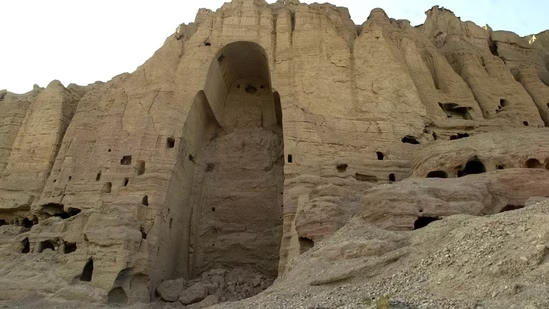Taliban's Controversial Bid: Capitalizing on Destroyed 6th-century Buddha Statues in Afghanistan
The Taliban's recent destruction of the 6th-century Buddha statues in Afghanistan's Bamiyan Valley has sparked outrage and condemnation worldwide. These ancient relics, recognized as UNESCO World Heritage sites, held immense cultural and historical significance. However, in a surprising turn of events, reports have emerged that the Taliban is planning to exploit the remnants of the destroyed statues to generate revenue, further igniting debates over cultural preservation and ethical considerations.
In early 2001, the Taliban executed their infamous act of cultural vandalism by demolishing two colossal Buddha statues, one standing at 38 meters tall and the other at 55 meters, which were carved into the sandstone cliffs of the Bamiyan Valley around the 6th century. This wanton destruction was carried out under the pretext of adhering to a strict interpretation of Islam, which denounces any form of idol worship. The tragic event was met with global dismay, as it marked an irreparable loss to the world's cultural heritage.
According to credible sources, the Taliban now intends to capitalize on the remnants of the destroyed Buddha statues. Their purported plan involves extracting valuable minerals, such as gypsum and limestone, from the rubble and selling them in the international market. These minerals have various industrial applications, and their trade could potentially bring substantial profits to the extremist group.
The Taliban's intention to profit from the destruction of the Buddha statues has raised significant ethical concerns. Critics argue that any exploitation of these cultural relics, even after their destruction, is an affront to the memory and significance they held for centuries. The statues were not merely stones; they represented the rich history, artistry, and spirituality of Afghanistan and its people.
Moreover, the sale of these ancient minerals might inadvertently encourage the destruction of other historical sites in Afghanistan and beyond. It sets a dangerous precedent, sending the message that cultural heritage is a commodity to be exploited for personal gain.
The international community has rallied in response to these reports, urging the Taliban to reconsider their plans and instead take steps to protect and preserve what is left of the Bamiyan Buddha statues. UNESCO has reiterated its commitment to safeguarding cultural heritage worldwide, emphasizing the need to respect the past while building a better future.
The Taliban's intention to profit from the destroyed 6th-century Buddha statues in Afghanistan has reignited debates on the preservation of cultural heritage and ethical responsibilities. The world watches closely as pressure mounts on the group to respect the memory of these ancient wonders and refrain from further compromising the rich history they represented. Ultimately, the fate of the remnants of the Buddha statues will serve as a test for the international community's dedication to preserving our shared cultural legacy.



Comments
Post a Comment